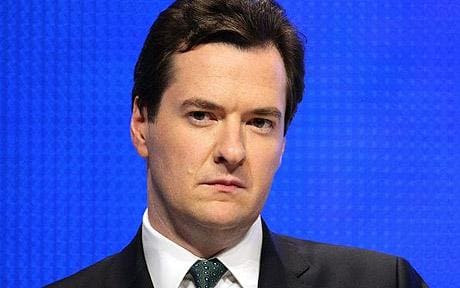George Osborne’s move to bring the £35bn proceeds of the Bank of England’s quantitative easing scheme into the Treasury and score them against the public finances has been rejected by the statistics watchdog, reports The Guardian.
In the run-up to December’s autumn statement, the Treasury announced that it would change the way it managed the interest payments on £375bn-worth of government bonds bought by the Bank of England with electronically created money under QE.
Instead of sitting on the Bank’s books, the proceeds would go straight to the Treasury. In February, the Office for National Statistics, which produces the public finances, confirmed that these interest payments could be treated in a similar way to tax receipts – conveniently helping to reduce the deficit.
Although the independent Office for Budget Responsibility, which produces forecasts for the Treasury, publishes calculations of the deficit on the public finances with and without the bond payments, the move allowed Osborne to announce in the autumn statement that borrowing would fall by 1% of GDP in 2012-13, and 0.8% of GDP in 2013-14.
Some commentators were sceptical about the ONS’s decision, because the Bank’s giant bond portfolio will eventually have to be sold, potentially at a large loss, and those losses are likely to wipe out the short-term gains from the interest payments. A recent report from the International Monetary Fund suggested that the losses on the sale of the bonds could be up to £80bn.
In a statementon Wednesday, the Statistics Authority, which oversees the activities of the ONS, upheld a complaint brought by the Financial Times that the new way of presenting the figures was potentially misleading.
It acknowledged concerns that the ONS’s decision “might have been influenced by presentational considerations rather than purely statistical considerations” and accused the ONS of adopting a “selective” reading of its own published guidance.
The watchdog also warned that it felt the decision had not been communicated properly to the public, saying that “the risk of undermining confidence associated with taking important decisions without explaining fully to users the processes, principles and decisions should be seen as an important consideration”.
Labour seized on the watchdog’s judgment as evidence that the chancellor had tried – and failed – to fiddle the figures.
“George Osborne should not be allowed to use smoke and mirrors to attempt to hide what’s really going on with government borrowing and debt, so it’s right that the presentation of these statistics is now reviewed. The chancellor’s failure on economic growth is why deficit reduction has stalled and he is now set to borrow £245bn more than planned. No amount of accounting trickery can hide this failure from the public.”
The decision was seen as particularly controversial because the government’s deficit reduction plans had effectively ground to a halt between 2011-12 and 2012-13 as the economy slowed.
However, a spokesman for the ONS denied that there had been any political influence on the decision about how the short-term income from QE should be treated.
He stressed that the ONS had already announced a review of public finance statistics, which will consider the question of how the QE proceeds will be treated, and is due to report in the autumn. A spokesman for the Statistics Authority said: “We have asked the ONS to take account of our findings, so we’ll be taking a close interest as the review progresses.”


